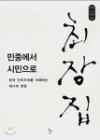
Choi Jang-jip
Seoul: Dolbegae, 2009
Reviewed by Prof. Park Tae Gyun, Graduate School of International Studies, Seoul National University
Choi Jang-jip is the most prominent political scientist among progressive academics in Korea. Since the 1990s, he has continuously suggested the kinds of politics needed to build a progressive Korean society.
As he wrote in the prologue to “From People to Citizens” the book is a collection of his lectures about Korean politics delivered in 2008. It is more like an essay than a scholarly monograph. But this essay is not inferior to more academic writings in terms of its profound analysis of the current Korean political and social situation.
In “Democracy after Democratization”, published in 2002, Choi criticized Korean politics for being only an empty frame, at a time when many other social scientists praised Korean democratization as a politically progressive breakthrough. In this book the author suggests a new critical perspective on generally accepted ideas in Korean society. He focuses on the past twenty years of experience of Korean politics rather than on theories of democracy or examples from other countries.
Choi acknowledges the benefit of conflict between progressives and conservatives for democratic advance, whereas many intellectuals emphasize the need to ‘communicate’ between them in order to resolve conflict. According to Choi, Korean conflicts can be divided into ‘reconcilable ones’ and ‘irreconcilable ones’, with the unification and nationalism issue belonging to the latter category. The problem is that this ‘irreconcilable conflict’ hinders the resolution of ‘reconcilable ones’.
Choi defines neo-liberalism as the product of politics as well as economics. The worsening bipolarization and poverty in Korea is the consequence not only of neo-liberalism, but also the lack of alternative policies. We should not irresponsibly criticize neo-liberalism, which is now generally taken for granted in Korean society, until we can offer superior policies to promote democratization. Such opinions provide us the insight to retrospect the post-democratization twenty years Korean society.
Choi’s analysis is a valuable retrospective on the past twenty years of Korean democratization. Although one would have liked to see greater discussion of generational change—in terms of age, class, gender, internet use, etc.—this important book nevertheless provides a sharp analysis of contemporary Korean society and a blueprint for future investigation.
